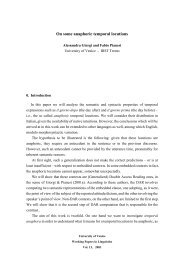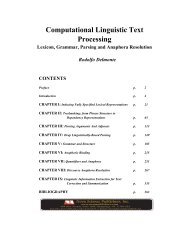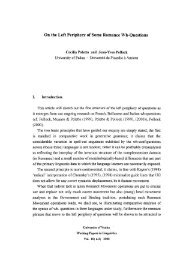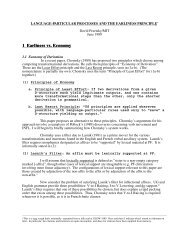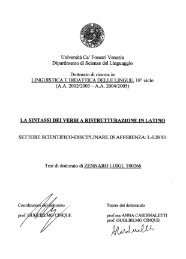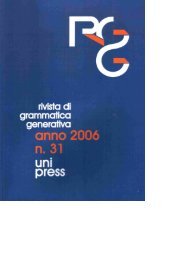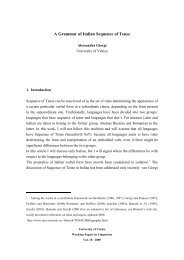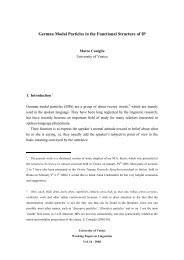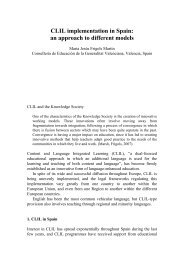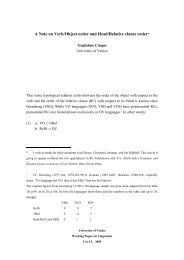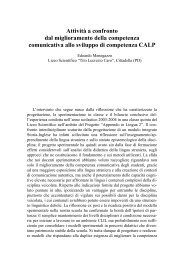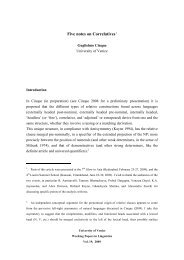1 GAPS, GHOSTS AND GAPLESS RELATIVES IN ... - ling.auf.net
1 GAPS, GHOSTS AND GAPLESS RELATIVES IN ... - ling.auf.net
1 GAPS, GHOSTS AND GAPLESS RELATIVES IN ... - ling.auf.net
Create successful ePaper yourself
Turn your PDF publications into a flip-book with our unique Google optimized e-Paper software.
contained within angle brackets below (an abstract counterpart of the structure found in<br />
sentences like 5c,d):<br />
(52) You look at some of the other papers, who it’s not going to be<br />
just the ‘News of The World’ running dodgy practices<br />
On this view, Ghosting in (52) would affect all material between the bold-printed fronted<br />
wh-word and the italicised embedded clause but leave intact the matrix CP layer<br />
(containing who), along with the italicised embedded CP.<br />
At first sight, any such Predicate Ghosting analysis might appear to be<br />
unprecedented and unmotivated. However, there are potential parallels here with Ross’s<br />
(1970) analysis of root declarative clauses as containing an abstract verb of SAY<strong>IN</strong>G, under<br />
which a sentence like (53a) below would be derived from a structure like (53b), involving<br />
Ghosting of all constituents other than the embedded clause<br />
(53) a. It is raining again<br />
b. it is raining again<br />
Thus, an analysis involving Predicate Ghosting is by no means unprecedented.<br />
Furthermore, such an extended Ghosting analysis could be argued to gain<br />
independent motivation from sentences like:<br />
(4) b. All we’ve had so far are words, which frankly we need to see the numbers<br />
(Economics reporter, BBC Radio 5)<br />
The adverb frankly is typically construed with the external argument of a predicate of<br />
SAY<strong>IN</strong>G or TH<strong>IN</strong>K<strong>IN</strong>G (e.g. in ‘Max says that frankly there is little hope of finding the<br />
hostages alive’, it is Max who is being frank). If we suppose that the italicised relative<br />
clause in (4b) contains the ghost structure contained within angle brackets below:<br />
(54) which frankly we need to see the numbers<br />
we can say that frankly is construed with I (i.e. with the speaker) in (4b).<br />
A second piece of evidence in support of the Predicate Ghosting analysis comes<br />
from sentences such as the following, in which the relative clause contains an (italicised)<br />
direct question (capitals in 55e marking contrastive stress):<br />
(55) a. The referee showed him a red card, [which what else could he have done in the<br />
circumstances?] (Alan Brazil, Talk Sport Radio)<br />
b. Then you launched these podcasts, [which how many times have these been<br />
downloaded?] (Richard Bacon, BBC Radio 5)<br />
c. We’re all humans living in a world [which what right does any country have to say<br />
“You can’t come and live here”?] (Listener, BBC Radio 5)<br />
d. Many students go to university and then have a gap year, [which by the way what’s<br />
that supposed to be for?] (Ian Collins, Talk Sport Radio)<br />
e. THERE’s a man [that is he gonna get his first ever podium?] (Steve Parrish, BBC2<br />
TV)<br />
f. Then we had Steve McClaren, [who, do you know what the thing about Steve<br />
McClaren was?] (Steve Claridge, BBC Radio 5)<br />
g. You’re looking at a lad in Rio [who is he gonna be fit to play for England?]<br />
(Alan Mullery, Sky Sports TV)<br />
h. And now it’s hello to Graham Taylor, [who have you managed to lift your head<br />
after that six-nil defeat at St James’s Park?] (Colin Murray, BBC Radio 5)<br />
18



